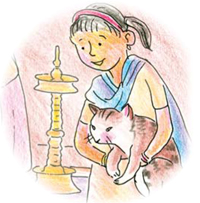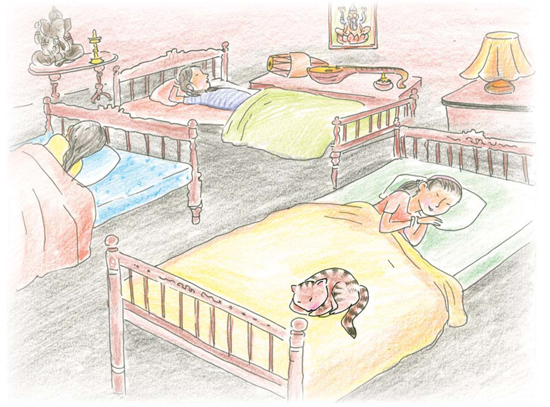How Our Family Became Vegetarians Again
Janaki walked down the road, soaking in the spectacular view of Stone Mountain, even as the sun’s rays lit it up like a glowing monument carved by nature. The walk back from school was never boring. She looked at the view, thinking that her home was a lot like the mountain—steady, strong, providing shelter for her and her elder sisters Vani and Reshma.§
As the three of them reached home, their mother opened the door and the wonderful smell of fresh dosas reached their noses. Janaki took a deep breath and said, “Ma, I’m hungry.” Her mother gave her a hug and said, “Wash first and come down.”§
“Why dosas and not chicken pastries today, Ma?” asked Janaki.§
“I just wanted you to taste the excellent chutney and sambar which Sunitha Aunty made for all of you.” Amma looked at the three girls and saw their innocent faces. Janaki, the youngest, was barely eight years old. Vani was twelve and tall for her age. Reshma, fourteen, was already blossoming into a young woman.§
“Why does Aunty only make vegetarian food? Can’t she learn to eat chicken like us?” asked Vani, dipping a piece of dosa into the steaming hot sambar.§
Amma averted her eyes and said, “You girls know that your grandma was a vegetarian, and your father and I were vegetarians, too, when we were in India. Somehow it is easy to be vegetarians in India, with most of our relatives and friends being vegetarians; but after coming to the US, we sort of adjusted ourselves to American culture, and we began eating nonvegetarian food. All of you, I know, are comfortable with both vegetarian and nonvegetarian food, and we aren’t forcing any particular food habits on you. But there are days when I remember my own mother and I wish I had never started eating nonvegetarian food. My mother was so slim and healthy. Even at eighty, she could see well, hear well and actually take care of herself. I wonder if I’ll be able to do that at her age. Well, enough talk about food. Tell me about your day at school.”§
Janaki suddenly said, “Amma, the other day when we went to the temple, the priest was talking to a few children about Mahatma Gandhi and how he was a vegetarian. He was also telling us something about ahimsa, but I didn’t understand very well.”§
“Ahimsa means nonviolence, dear,” replied Amma, as she placed another hot dosa on Janaki’s plate. “Nonviolence means not only being nonviolent in your actions, but also in your words and even in your thoughts and intentions. It means not harming another in any way at all.”§
“If that’s what it means, we aren’t practicing it!” said Janaki matter-of-factly. §
“Why?” asked Amma in surprise. “We are nonviolent people. Are we fighting, or what?”§
“No. But we eat animals, like chicken and lamb. Aren’t we being cruel to them and not practicing ahimsa?”§
Reshma tapped her hand impatiently on the table and said, “Drop this silly topic. You enjoy eating chicken as much as we all do. What’s this sudden concern for animal welfare?”§
Janaki continued to eat, but her mind was elsewhere. Suddenly, she said, “Speaking of animals, where’s Puli?” The Bengali cat had come to their house as a mischievous kitten when he was a few months old and adopted Janaki as his favorite person. Within two years, he had grown into a big cat and spent most of his time sitting on the fence outside the house. His brown fur had black stripes, giving him the appearance of a small tiger, so they called him Puli. That’s Tamil for “tiger.”§
“Puli, where are you?” shouted Janaki. In return, she heard a soft meow. She peeped under the stairway and saw Puli curled up cozily. Janaki lifted the cat and tenderly carried him with her. Opening one yellow-flecked eye, the cat gave her a grumpy look. He seemed to be saying, “Why are you disturbing my royal nap?”§
The evening wore on, and towards night, the girls went to the large bedroom which the three shared. The house had space for two more rooms, and construction would begin soon. Reshma walked in and said, “I can’t wait to get my own room.”§
“Once you have your own room and Vani gets hers, this will become mine, right? And then I can keep Puli with me?”§
“As it is, he spends all his time here. Where else does he go?” asked Vani. She looked over at Puli as he lay dozing at the foot of the bed. “He seems to be growing lazier day by day,” said Reshma, as she tickled the cat playfully. Purring in enjoyment, Puli stretched his body and settled down in a more comfortable position.§
It was a clear night, and somewhere in the distance an owl hooted loudly. In the elm tree near the bedroom, a bird was perched on its nest. The whole atmosphere was one of peace and soft happiness. As Janaki rested her head on her soft pillow, she uttered a prayer of thanks to Lord Siva for giving her so much.§
In her dream, she was sharing with the class an essay on “Festivals in India.” As she talked about Diwali, she explained the fireworks. Her dream was filled with a demonstration of colorful lights and noise, when suddenly her sleep was disturbed by a different kind of noise. She woke up suddenly, feeling a bit lost and unsure of her surroundings. Janaki looked around at the dark room and tried to figure out what had woken her up. She heard the sound again and felt a sudden chilling fear. It was a strange, ghastly sound! She was now wide awake. She strained to hear the sound, and realized that it was Puli. Yet it was not his usual meowing. Suddenly she wondered if the cat was injured. Springing up, she switched on her bedside lamp, saying, “Puli, where are you?”§
As the light came on, her eyes swept to the ground. To her horror, she saw a bright red stain. “Vani!” she screamed, and Vani woke up with a fright. In the other bed, Reshma swung to consciousness. Both sisters came rushing to her, only to stop in their tracks as their eyes took in the blood trail on the tile floor. “Where is all this blood from? Janaki, are you okay?” shouted Reshma. The two sisters rushed to her bed.§
“I, I, I think it’s Puli. He’s meowing in a strange way, and that’s why I woke up.”§
Vani switched on a few more lights in the room and looked around her. Sitting in a corner was Puli, and near his paws lay the biggest rat that Vani had ever seen in her life. The rat lay dead, with blood oozing from its body. As she watched it, she felt her sisters coming up behind her. The three of them stared with horror at the sight in front of them. Puli looked very proud of his catch, and Janaki exclaimed, “He brought it to share with us! Ugh!”§
Hearing the noise, Appa and Amma had come upstairs. Appa took the rat by the tail and tossed it outside. Janaki got a cloth and cleaned up the blood. Puli was upset that his rat had been tossed out and ran after it. The three girls went back to bed in a state of shock. They did not sleep well.§
The next evening Uncle and Aunty dropped by for dinner. Out of respect for them, the menu was a vegetarian one. As soon as they walked in, Vani rushed to Uncle and narrated the night’s incident. Uncle looked thoughtful as he watched Janaki’s disturbed face. Slowly he said, “What’s wrong?”§
Amma looked with surprise at Uncle and said, “What do you mean, ‘What’s wrong?’ They actually saw the cat tearing up a rat in front of their eyes. You should have seen the blood! And you being a vegetarian, you’re asking me what is wrong?”§
He looked at Amma and said, “You eat meat! Why are you shocked that your cat eats meat? Your meat is cooked and his meat is not cooked. What else is the difference?”§
Amma looked stunned for a moment and then she said rather defensively, “We buy our chicken from the supermarket, where it has been cleaned and packed. We don’t see blood dripping all over the place.”§
Uncle laughed and said, “That is not a satisfactory explanation. You know that the chicken on the supermarket shelf did not appear there miraculously. Someone has killed and cleaned it for you.”§
Janaki looked at Amma, her sisters and her uncle, and she said, “Uncle, does this mean that we should not eat nonvegetarian food?”§
Uncle said softly, “My dear child, human beings have teeth and a digestive system designed to eat vegetarian food. The cat is designed to catch, kill and eat meat. It is not wrong for him to do so to feed himself and his family. But we humans kill animals, cook the meat to make it soft and then we eat it. This is unnecessary. We don’t need to kill to eat. We humans should practice ahimsa, nonviolence, and respect the life of every single creation of God. I realized this early in my life and have been a happy vegetarian, just as my parents—your grandparents—were.”§
The entire family sat in silence for a few seconds.§
Eight-year-old Janaki spoke first, “I think from now on I will be a vegetarian.”§
“Me, too,” said Reshma and Vani at the very same time.§
Appa looked at Amma, and then at Uncle.§
He said, “I knew this day would come. I never felt right about eating meat. From this day on, we are a vegetarian family again!”§








